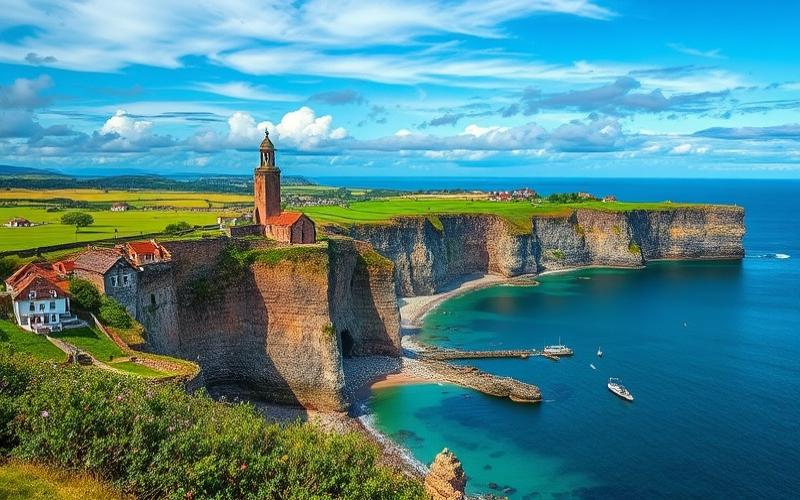
 Published on and written by Cyril Jarnias
Published on and written by Cyril Jarnias
Ireland, with its dynamic economy and attractive living environment, is increasingly attracting international real estate investors. This article explores the reasons why Ireland has become a sought-after destination for real estate investment, as well as practical aspects to consider before embarking on this adventure.
Explore other articles about real estate investment in Ireland:


Ireland, with its lush landscapes, rich cultural heritage, and dynamic economy, has become a preferred destination for wealthy investors seeking [...]


Ireland, with its lush landscapes, vibrant cities, and rich cultural heritage, is attracting an increasing number of international real estate [...]


Ireland is currently experiencing an exciting period in real estate, with a booming market attracting increasing numbers of local and [...]


Ireland, with its breathtaking coastal landscapes, dramatic cliffs, and pristine sandy beaches, is attracting more and more real estate investors [...]


Ireland, with its dynamic economy and enviable quality of life, is attracting more and more real estate investors from around [...]


Ireland, with its dynamic economy and attractive real estate market, is increasingly drawing foreign investors. However, before diving into property [...]


Ireland, with its lush landscapes and dynamic economy, is attracting an increasing number of foreign real estate investors. Whether you [...]


Ireland, with its lush landscapes, rich cultural heritage, and dynamic economy, is attracting an increasing number of foreign investors to [...]


Ireland, with its lush landscapes, medieval castles, and cozy pubs, attracts millions of visitors from around the world each year. [...]


Ireland, with its lush landscapes, medieval castles, and vibrant cities, attracts millions of visitors from around the world each year. [...]


Ireland, with its lush landscapes and rich cultural heritage, is increasingly attracting international real estate investors. Whether you’re looking for [...]


Ireland has become a premier destination for international real estate investors in recent years. With its favorable tax system and [...]


Ireland is attracting more and more foreign investors with its dynamic real estate market and picturesque landscapes. However, buying property [...]


Ireland, with its lush green landscapes and rich architectural heritage, offers numerous opportunities to renovate properties and increase their value. [...]


The Irish real estate market is dynamic, but selling your property quickly requires a well-thought-out strategy. Here are expert tips [...]


Ireland, with its lush landscapes, spectacular coastlines, and rich cultural heritage, is attracting an increasing number of real estate investors [...]
Ireland: A Booming Real Estate Market
Real estate investment in Ireland offers numerous advantages that make it a particularly interesting option for foreign investors. Here are the main reasons explaining the growing appeal of this market:
- Robust economic growth: Ireland boasts one of the strongest economic growth rates in Europe, with consistently rising GDP in recent years. This economic vitality translates into sustained demand in the real estate market.
- Political stability: The country benefits from a stable political environment, reassuring investors in the long term.
- Dynamic rental market: The presence of numerous international companies, particularly in the technology sector, generates strong rental demand, especially in major cities like Dublin.
- Attractive rental yields: Rental yields in Ireland are among the highest in Europe, offering interesting prospects for investors.
- Favorable tax framework: Ireland offers a tax environment favorable to real estate investors, with competitive tax rates.
These combined factors make Ireland a prime destination for real estate investors looking to diversify their portfolio in a stable and promising European market.
Good to know:
Ireland regularly ranks among the most attractive countries for foreign direct investment in Europe, which supports long-term real estate demand.
The Irish Real Estate Market: Constantly Rising Prices
The Irish real estate market has experienced significant growth in recent years, with prices steadily increasing in most regions of the country. This upward trend reflects Ireland’s economic vitality and the country’s growing appeal to national and international investors.
Average Price Evolution:
According to the latest available data, the average price of a home in Ireland reached €350,000 in 2025, representing an increase of nearly 20% compared to 2020. This rise is particularly pronounced in large cities and urban areas, where demand remains strong.
Regional Variations:
It’s important to note that prices vary considerably by region:
- Dublin: The capital remains the most expensive area, with average prices exceeding €450,000 for an apartment.
- Cork: The country’s second city, Cork shows average prices around €300,000 for an apartment.
- Galway: In this western city, average prices are around €280,000 for an apartment.
- Rural areas: Prices are generally more affordable, with averages ranging between €180,000 and €250,000 depending on the region.
Factors Influencing Prices:
Several factors contribute to the continuous rise in real estate prices in Ireland:
- Housing shortages in major cities, particularly Dublin
- Constant influx of international companies and skilled workers
- Historically low interest rates that facilitate access to credit
- Ireland’s growing attractiveness as a post-Brexit investment destination
This price dynamic offers interesting prospects for investors, both in terms of potential capital gains and rental yields.
Good to know:
Despite rising prices, the Irish real estate market remains relatively affordable compared to other major European cities like London or Paris, making it an attractive option for international investors.
A Range of Real Estate Choices for All Budgets
The Irish real estate market offers a wide variety of properties, suitable for different investor profiles and budgets. Here’s an overview of the main types of housing available, with price examples for the year 2025:
Downtown Apartments:
Highly sought after by young professionals and students, these properties offer excellent rental prospects.
- Studio in Dublin: starting at €250,000
- 2-bedroom apartment in Cork: around €220,000
- 3-bedroom apartment in Galway: around €300,000
Single-Family Homes:
Ideal for families, these properties are particularly sought after in the suburbs of large cities.
- 3-bedroom house in Dublin: starting at €450,000
- 4-bedroom house in Limerick: around €350,000
- Traditional cottage in County Kerry: around €200,000
Rental Investment Properties:
These properties are specifically designed for rental, often with multiple units in the same building.
- 4-apartment building in Waterford: starting at €600,000
- 10-room student residence in Galway: around €1,000,000
Luxury Properties:
For high-end investors, Ireland also offers exceptional properties.
- Seafront penthouse in Dublin: starting at €2,000,000
- Historic manor in County Wicklow: around €3,500,000
Rural Properties:
Investors looking for tranquility and space will find their happiness in the Irish countryside.
- Renovated farm in County Clare: around €400,000
- Buildable land with ocean view in Donegal: starting at €100,000
This diversity of offerings allows investors to find opportunities matching their objectives, whether it’s generating regular rental income, achieving long-term capital gains, or simply acquiring a secondary residence in an enchanting setting.
Good to know:
Properties offering a good balance between attractive location and rental yield potential, such as apartments near business centers or universities, are particularly sought after by investors.
The Most Promising Investment Areas
Ireland offers numerous real estate investment opportunities, but some areas stand out particularly for their growth potential and attractiveness. Here’s an overview of the most promising regions for investors:
Dublin: The Country’s Economic Heart
The Irish capital remains unquestionably the most attractive area for real estate investment. Several neighborhoods stand out:
- Dublin 2 and 4: Prime downtown areas, ideal for high-end investments
- Dublin 1, 7 and 8: Neighborhoods undergoing gentrification, offering good capital gain opportunities
- Docklands: The booming business district, highly sought after by expatriate professionals
Cork: The Second City in Full Expansion
Cork is experiencing rapid growth, particularly due to its technology and pharmaceutical hub. Areas to watch include:
- City center: For rental investments targeting young professionals
- Blackrock and Douglas: Residential neighborhoods popular with families
Galway: The Pearl of Western Ireland
A dynamic university and cultural city, Galway is attracting more and more investors. The most promising areas are:
- The Latin Quarter: Ideal for short-term rentals and students
- Salthill: Attractive coastal area for secondary residences
Limerick: An Emerging Market
Limerick is experiencing an economic revival that is reflected in its real estate market. Opportunities can be found particularly:
- In the city center: Undergoing urban renewal
- In Castletroy: Close to the university, ideal for student rental investment
Coastal Counties: For Lifestyle Investment
Counties like Kerry, Clare, or Donegal offer interesting opportunities for investors looking for vacation properties or seasonal rental properties.
Developing Secondary Cities
Cities like Waterford, Kilkenny, or Athlone are experiencing promising economic development and offer investment opportunities at more affordable prices than in major metropolitan areas.
Good to know:
Areas benefiting from significant public infrastructure investments, such as new transport lines or technology parks, often indicate future real estate appreciation.
Ireland Compared to Its European Competitors
To better understand the appeal of real estate investment in Ireland, it’s useful to compare it to other popular European destinations. Here’s how Ireland positions itself relative to its main competitors:
Ireland vs United Kingdom
- Prices: Irish real estate remains generally cheaper than in the UK, particularly compared to London.
- Rental yields: Ireland often offers higher yields, particularly in Dublin (5-7%) versus 3-5% in London.
- Stability: Ireland benefits from its position within the EU, offering more certainty post-Brexit.
Ireland vs Spain
- Economic growth: Ireland shows more robust and stable growth than Spain.
- Labor market: The unemployment rate is significantly lower in Ireland, supporting rental demand.
- Seasonality: Unlike some Spanish regions, the Irish rental market is less dependent on seasonal tourism.
Ireland vs Portugal
- Taxation: Although Portugal offers attractive tax benefits for foreign retirees, Ireland provides a generally favorable tax environment for investors.
- Economic dynamism: The Irish economy is more diversified and oriented toward high-technology sectors.
Ireland vs Germany
- Growth potential: The Irish real estate market generally offers higher capital gain potential than Germany.
- Regulation: Germany has stricter rental regulations, while Ireland offers more flexibility to property owners.
Ireland vs France
- Investment ease: Ireland offers a purchase process often simpler and faster than in France.
- Language: With English as the official language, Ireland may be more accessible for international investors.
This comparison highlights several competitive advantages of Ireland:
- A dynamic real estate market with good growth potential
- Attractive rental yields, particularly in large cities
- A robust and diversified economy, supporting real estate demand
- A regulatory and tax environment favorable to investors
- A strategic position as an English-speaking gateway to the European Union
Good to know:
Although each market has its specificities, Ireland stands out for its balance between growth potential, economic stability, and attractive yields, making it a prime option for investors seeking to diversify their real estate portfolio in Europe.
Investing in Ireland: A Process Accessible to Foreigners
One of the questions frequently asked by foreign investors concerns the possibility of acquiring property in Ireland. The good news is that the Irish real estate market is largely open to international buyers, with few restrictions.
A Favorable Legal Framework
Unlike some countries that impose strict limitations on foreign buyers, Ireland adopts an open approach:
- No restrictions based on nationality: Foreigners have the same rights as Irish citizens to purchase real estate properties.
- No limit on the number of properties: A foreign investor can acquire as many properties as desired.
- Full ownership: Foreign buyers can hold full ownership of acquired properties.
The Purchase Process
Although the process is relatively simple, it’s recommended to follow these steps:
- Obtain a PPS number (Personal Public Service): Equivalent to a social security number, it’s necessary for various administrative procedures.
- Open an Irish bank account: Facilitates transactions and management of rental income.
- Engage a local lawyer: To ensure all legal procedures are correctly carried out.
- Conduct thorough due diligence: Verification of property title, any charges, etc.
- Obtain financing: Possible from Irish banks or through international loans.
Tax Considerations
Foreign investors should be aware of tax implications:
- Tax on rental income: Income generated is subject to Irish tax.
- Property tax: Called “Local Property Tax,” it’s due annually.
- Capital gains tax: Upon resale, a tax on capital gains may apply.
Remote Management
For investors not residing in Ireland, several management options are available:
- Property management agencies: Offer comprehensive property management services.
- Online platforms: Facilitate remote management for short-term rentals.
- Local partnerships: Possibility to partner with local players for more personalized management.
Good to know:
Although the process is open to foreigners, it’s highly recommended to surround yourself with local professionals (lawyer, accountant, real estate agent) to effectively navigate the Irish real estate market and optimize your investment.
Rental Profitability in Ireland: Promising Figures
One of the main attractions of real estate investment in Ireland lies in the attractive rental profitability prospects. Here’s an overview of the yields investors can expect, illustrated with concrete examples:
Average Yields by City
Gross rental yields vary by city and property type:
- Dublin: 5% to 7%
- Cork: 6% to 8%
- Galway: 5.5% to 7.5%
- Limerick: 7% to 9%
- Waterford: 8% to 10%
Profitability Example in Dublin
Take the example of a 2-bedroom apartment in the Dublin 8 area:
- Purchase price: €350,000
- Monthly rent: €2,000
- Annual rental income: €24,000
- Gross yield: 6.86%
After deducting expenses (insurance, property tax, maintenance), the net yield could be around 5%.
Profitability Example in Cork
For a 3-bedroom house in a residential area of Cork:
- Purchase price: €300,000
- Monthly rent: €1,800
- Annual rental income: €21,600
- Gross yield: 7.2%
The net yield, after expenses, could reach 5.5% to 6%.
Factors Influencing Profitability
Several elements can positively impact profitability:
- Renting to students or young professionals: Can increase yields, particularly in university cities.
- Short-term rental: In tourist areas, can generate higher income, but with more intensive management.
- Strategic renovation: Improving property quality can justify higher rents.
- Location choice: Proximity to transport, business centers, or universities can boost demand and rents.
Evolution Perspectives
Irish real estate market analysts predict stability, or even a slight increase in rental yields in the coming years, supported by:
- Continued economic growth
- Continuous influx of international companies and skilled workers
- Persistent housing shortages in large cities
Good to know:
Although yields may vary, Ireland generally offers rental profitability prospects superior to many other European destinations, particularly due to strong demand in urban centers and the country’s sustained economic growth.
Conclusion: Ireland, a Land of Opportunities for Real Estate Investment
Real estate investment in Ireland presents numerous advantages that make it a particularly attractive option for foreign investors. Let’s recap the main strengths:
- A dynamic market with consistently growing prices
- Rental yields among the highest in Europe
- A robust and diversified economy, supporting real estate demand
- A legal and tax framework favorable to foreign investors
- A variety of properties suitable for different investor profiles
- Promising investment areas, both in large cities and coastal regions
However, as with any investment, it’s crucial to adopt a thoughtful and well-informed approach:
- Conduct thorough due diligence before any purchase
- Surround yourself with local professionals to effectively navigate the market
- Consider tax implications and long-term management costs
- Stay attentive to market developments and emerging opportunities
Ireland offers an attractive balance between growth potential, economic stability, and attractive yields. Whether to diversify a real estate portfolio, generate regular rental income, or simply invest in a country with rich cultural heritage, Ireland positions itself as a prime destination for savvy real estate investors.
Good to know:
The key to success in real estate investment in Ireland lies in a well-informed approach, a clear strategy, and a long-term vision. With these elements in place, the opportunities offered by the Irish market can prove particularly fruitful.
Disclaimer: The information provided on this website is for informational purposes only and does not constitute financial, legal, or professional advice. We encourage you to consult qualified experts before making any investment, real estate, or expatriation decisions. Although we strive to maintain up-to-date and accurate information, we do not guarantee the completeness, accuracy, or timeliness of the proposed content. As investment and expatriation involve risks, we disclaim any liability for potential losses or damages arising from the use of this site. Your use of this site confirms your acceptance of these terms and your understanding of the associated risks.



